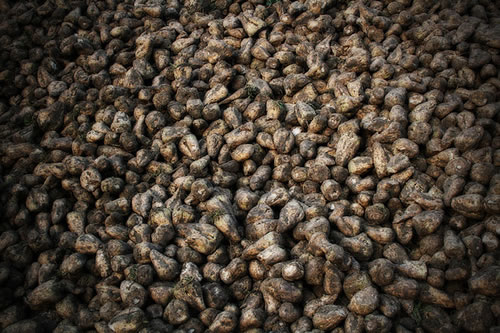
Beet growers have been advised to think carefully before committing to contracts for the 2011 crop amid continuing concern for the completion of the 2010 campaign.
Still-escalating wheat prices look set to focus attention on the coming price-setting for the 2011/12 crop, but rising fertiliser costs and a new warning that growers face higher costs for key beet herbicides must also be considered before embarking on the sugar beet route, says independent consultant David Bolton.
"Over £20m-worth of crop is still at risk," he estimates. "British Sugar is bending over backwards to try to get it into the factories and with NFU co-operation is moving beet all over the place to allow processing in the fastest possible time. Nevertheless growers know some crops will never make it as far as their bank accounts.
"If beet has to be disced once or twice and then ploughed, there will clearly be an impact on any spring cropping if it happens on a large scale. It’s also likely to focus many growers’ attention on whether beet remains attractive as a crop. You can be sure British Sugar and NFU will also review the risk profile inherent in long campaigns like this one."
The issue has clearly hit a chord with growers; a thread discussing the sugar beet situation was one of the week’s most popular topics on the British Farming Forum website, with hundreds of replies within just a few days, many expressing thoughts of quitting sugar beet growing next season. British Sugar waiving the contract performance rules for this unprecedented campaign means frost-affected growers will not be stung.
"The price difference between quota price and 20% over-quota price was to be just £2.60/t," Mr Bolton says. "An open contract for £23.60 now looks better still".
"There was evident disappointment last summer when the main price was set at £23.60/t because not only was it was lower than the previous year, but neither was it felt reflective of the situation. Last year’s reference period was when the price of wheat and the euro rate were pretty dreadful, hence the final low price," Mr Bolton notes. "It would be different today and will certainly be for 2012".
"True, it probably helped in the decision-making for the 300 or so beet growers who took advantage of last year’s Outgoers scheme - it’s allowed another 220,000t of quota to be traded."
It has been suggested that reworking the price at current figures would yield a figure closer to £28/t, assuming no change in input costs. But although the rise in fertiliser cost has been anticipated, growers also received warning this week of significant price increases for two key beet herbicides. Production problems and factory closures at one of the two plants supplying metamitron - contained in brands such as Goltix - has prompted expectations of an increase of up to 25 per cent. Another important beet herbicide, ethofumesate, is likely to see an increase of between 10 and 12 per cent.
"Back in October, I was predicting margins of up to £711/ha (depending on contractor involvement) for additional beet," notes Mr Bolton. "That’s what a grower with expertise in the crop can make.
"Now he’s going to have to take account of these increased prices for fertiliser and herbicide, but a capable and experienced grower with a good grasp of agronomy will be able to cope. They will now also receive a rebate of 50% their 2011/2012 seed costs if they achieve 100% CTE in the next campaign – that could be worth an extra £90/hectare now.
"At £23.60/t for the main beet crop, it’s the below average grower who will need to examine more closely than ever his gross margin figures and be sure that there aren’t alternative spring crops which could help lessen his risk if we have another difficult winter for the 2011 campaign."
